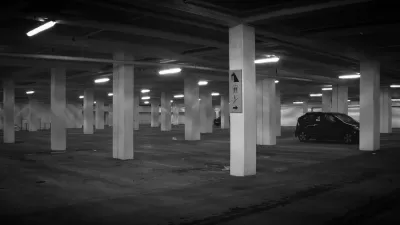An architect makes the case for future-proofing new parking garages so they can easily shift to other uses in a future with fewer cars.

Megan Ridgeway's hunch is that "our cultural shift to ride sharing, autonomous vehicles, and alternative transportation will result in a permanent paradigm shift in urban planning." Whether that means fewer cars on the road is hard to say, but if driving does decline, what will become of America's half-billion parking spaces?
Parking garages, Ridgeway argues, should be "future-proofed" upon construction. If and when a carless future arrives, they'll be easy to convert to alternative uses, including housing. "Specifically, the most important design strategies for such structures are flat plates and adequate space between floors. Adaptive reuse requires a level base rather than the steep slopes that many garages have, so designing flat floors on every level is critical."
In this case, future-proofing shouldn't be too onerous an expense: "the up-front cost is virtually the same as traditional parking garages because they aren't as expensive to build as an actual office or apartment building." The real question is whether individual municipalities will help or hinder their implementation.
Ridgeway cites Denver as one place where developers are pioneering future-proof parking, specifically at the city's World Trade Center.
FULL STORY: Design parking garages so they can easily become housing

Planetizen Federal Action Tracker
A weekly monitor of how Trump’s orders and actions are impacting planners and planning in America.

Congressman Proposes Bill to Rename DC Metro “Trump Train”
The Make Autorail Great Again Act would withhold federal funding to the system until the Washington Metropolitan Area Transit Authority (WMATA), rebrands as the Washington Metropolitan Authority for Greater Access (WMAGA).

DARTSpace Platform Streamlines Dallas TOD Application Process
The Dallas transit agency hopes a shorter permitting timeline will boost transit-oriented development around rail stations.

Renters Now Outnumber Homeowners in Over 200 US Suburbs
High housing costs in city centers and the new-found flexibility offered by remote work are pushing more renters to suburban areas.

The Tiny, Adorable $7,000 Car Turning Japan Onto EVs
The single seat Mibot charges from a regular plug as quickly as an iPad, and is about half the price of an average EV.

Supreme Court Ruling in Pipeline Case Guts Federal Environmental Law
The decision limits the scope of a federal law that mandates extensive environmental impact reviews of energy, infrastructure, and transportation projects.
Urban Design for Planners 1: Software Tools
This six-course series explores essential urban design concepts using open source software and equips planners with the tools they need to participate fully in the urban design process.
Planning for Universal Design
Learn the tools for implementing Universal Design in planning regulations.
Municipality of Princeton
Roanoke Valley-Alleghany Regional Commission
City of Mt Shasta
City of Camden Redevelopment Agency
City of Astoria
Transportation Research & Education Center (TREC) at Portland State University
US High Speed Rail Association
City of Camden Redevelopment Agency
Municipality of Princeton (NJ)





























